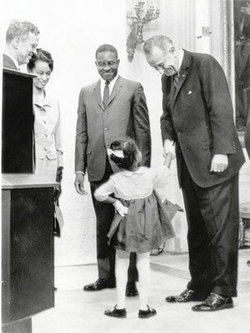Thereafter, Andrew served in the United States Army from 1945 to 1946. He then attended the University of Washington in Seattle, Washington, where he obtained both his bachelor's and master's degrees. In 1951, Brimmer received a Fulbright scholarship to study in India and then enrolled in 1952 in Harvard University in Cambridge, Massachusetts. In 1957, he received his Ph.D.
Then in 1966 became the first black member of the Federal Reserve Board, has died. He was 86. Brimmer died Oct. 7 at a Washington hospital after a lengthy illness, said his daughter, Esther Brimmer. An economist, Brimmer held a doctorate from Harvard Business School and several high-ranking positions in Washington. He worked as a staff economist for the Federal Reserve Bank of New York and as an economics professor before being named a deputy assistant secretary of commerce under President John F. Kennedy. Upon nominating him to the Federal Reserve Board, President Lyndon B. Johnson praised his integrity, brilliance and "sense of fair play that I believe will enable him to serve with distinction." During more than eight years on the board, Brimmer became known as an expert on international monetary policy. Early on, he supported the board's effort to combat inflation by gradually raising interest rates. After Congress and Johnson raised taxes and trimmed spending in 1968, Brimmer was one of the first Fed governors to call for easing rates. In later years on the board, he drew attention for blunt observations on the economic conditions of black Americans that included references to black-owned banks as "ornaments" and to the "fallacy of black capitalism." "Perhaps inadvertently" the banks "may be diverting resources from the black community into the financing of the national debt," he said, according to the New York Times. In 1974, he left the board to join the faculty of Harvard Business School and later taught at Michigan State University and the University of Pennsylvania. The Fed has had two black governors since — Emmett Rice and Roger W. Ferguson. In an e-mail, Ferguson called Brimmer "a role model for a generation of African-Americans who aspired to be economic policy makers. Only in America could the son of a sharecropper rise to become a national leader." Brimmer was born Sept. 13, 1926, in Newellton, a rural village in northeastern Louisiana. After serving in the Army during World War II, he received a bachelor's degree in economics in 1950 and a master's degree in 1951 from the University of Washington. He earned his doctorate in 1957 from Harvard. As a Fulbright scholar, he studied in India at the Delhi School of Economics and what was then known as the University of Bombay. In the 1990s, Brimmer was the first chairman of the District of Columbia Financial Control Board. Since 1991, he had been principal economic policy advisor to Bermuda's Ministry of Finance. For more than 40 years, he served on the board of Alabama's Tuskegee University, which named its business school building for him. Brimmer is survived by his wife Doris and daughter Esther, who is U.S. assistant secretary of state for international organization affairs.
Thereafter, Andrew served in the United States Army from 1945 to 1946. He then attended the University of Washington in Seattle, Washington, where he obtained both his bachelor's and master's degrees. In 1951, Brimmer received a Fulbright scholarship to study in India and then enrolled in 1952 in Harvard University in Cambridge, Massachusetts. In 1957, he received his Ph.D.
Then in 1966 became the first black member of the Federal Reserve Board, has died. He was 86. Brimmer died Oct. 7 at a Washington hospital after a lengthy illness, said his daughter, Esther Brimmer. An economist, Brimmer held a doctorate from Harvard Business School and several high-ranking positions in Washington. He worked as a staff economist for the Federal Reserve Bank of New York and as an economics professor before being named a deputy assistant secretary of commerce under President John F. Kennedy. Upon nominating him to the Federal Reserve Board, President Lyndon B. Johnson praised his integrity, brilliance and "sense of fair play that I believe will enable him to serve with distinction." During more than eight years on the board, Brimmer became known as an expert on international monetary policy. Early on, he supported the board's effort to combat inflation by gradually raising interest rates. After Congress and Johnson raised taxes and trimmed spending in 1968, Brimmer was one of the first Fed governors to call for easing rates. In later years on the board, he drew attention for blunt observations on the economic conditions of black Americans that included references to black-owned banks as "ornaments" and to the "fallacy of black capitalism." "Perhaps inadvertently" the banks "may be diverting resources from the black community into the financing of the national debt," he said, according to the New York Times. In 1974, he left the board to join the faculty of Harvard Business School and later taught at Michigan State University and the University of Pennsylvania. The Fed has had two black governors since — Emmett Rice and Roger W. Ferguson. In an e-mail, Ferguson called Brimmer "a role model for a generation of African-Americans who aspired to be economic policy makers. Only in America could the son of a sharecropper rise to become a national leader." Brimmer was born Sept. 13, 1926, in Newellton, a rural village in northeastern Louisiana. After serving in the Army during World War II, he received a bachelor's degree in economics in 1950 and a master's degree in 1951 from the University of Washington. He earned his doctorate in 1957 from Harvard. As a Fulbright scholar, he studied in India at the Delhi School of Economics and what was then known as the University of Bombay. In the 1990s, Brimmer was the first chairman of the District of Columbia Financial Control Board. Since 1991, he had been principal economic policy advisor to Bermuda's Ministry of Finance. For more than 40 years, he served on the board of Alabama's Tuskegee University, which named its business school building for him. Brimmer is survived by his wife Doris and daughter Esther, who is U.S. assistant secretary of state for international organization affairs.
Gravesite Details
Note: Interred December 21, 2012
Sponsored by Ancestry
Advertisement
Records on Ancestry
Advertisement






